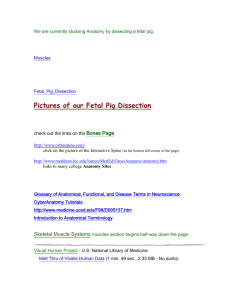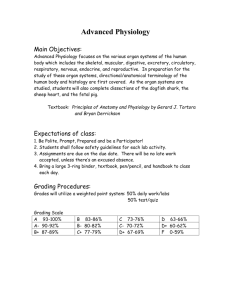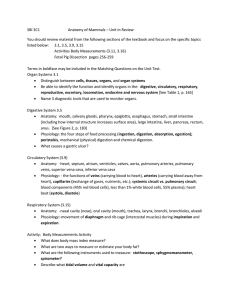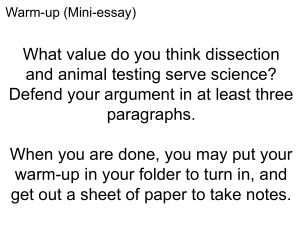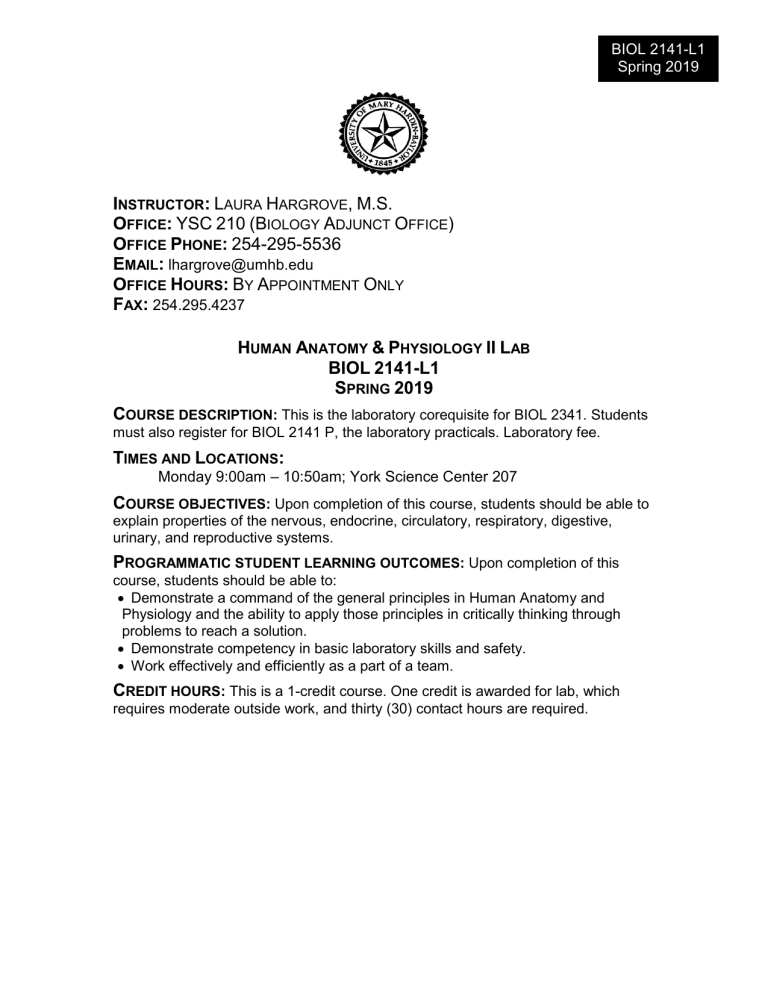
BIOL 2141-L1
Spring 2019
INSTRUCTOR: LAURA HARGROVE, M.S.
OFFICE: YSC 210 (BIOLOGY ADJUNCT OFFICE)
OFFICE PHONE: 254-295-5536
EMAIL: lhargrove@umhb.edu
OFFICE HOURS: BY APPOINTMENT ONLY
FAX: 254.295.4237
HUMAN ANATOMY & PHYSIOLOGY II LAB
BIOL 2141-L1
SPRING 2019
COURSE DESCRIPTION: This is the laboratory corequisite for BIOL 2341. Students
must also register for BIOL 2141 P, the laboratory practicals. Laboratory fee.
TIMES AND LOCATIONS:
Monday 9:00am – 10:50am; York Science Center 207
COURSE OBJECTIVES: Upon completion of this course, students should be able to
explain properties of the nervous, endocrine, circulatory, respiratory, digestive,
urinary, and reproductive systems.
PROGRAMMATIC STUDENT LEARNING OUTCOMES: Upon completion of this
course, students should be able to:
Demonstrate a command of the general principles in Human Anatomy and
Physiology and the ability to apply those principles in critically thinking through
problems to reach a solution.
Demonstrate competency in basic laboratory skills and safety.
Work effectively and efficiently as a part of a team.
CREDIT HOURS: This is a 1-credit course. One credit is awarded for lab, which
requires moderate outside work, and thirty (30) contact hours are required.
REQUIRED TEXTS:
Human Anatomy & Physiology Laboratory Manual by Marieb et al.
ISBN 978-1-2698-2643-3 (note: this is a custom product)
Copyright 15, Edition 1
$8 fetal pig fee
OPTIONAL TEXTS:
Rapid Review: Anatomy Reference Guide by Anatomical Charts
ISBN 978-1-60547-102-0
Copyright 10, Edition 3
Quick Study Fetal Pig by Bar Charts
ISBN 978-1-4232-0177-9
ACADEMIC HONESTY: The UMHB policy on academic integrity applies to all
courses. Please refer to the policy, which is published in the academic catalog and in
the student handbook. Honesty and integrity are necessary in all aspects of work at
The University of Mary Hardin-Baylor. Plagiarism or other forms of cheating will
result in a grade of 0 on the assignment and could result in failing the course.
Incidents will also be reported to the registrar and appear on your record.
DISABLED STUDENT SERVICES AND ACCOMMODATIONS: It is the student’s
responsibility to request disability accommodations. If you require an
accommodation for a disability, contact the UMHB Counseling, Testing & Health
Services as early as possible in the term. The Course Catalog, Student Handbook
and UMHB website provide more details regarding the process by which
accommodation requests will be reviewed.
We will gladly make any accommodations necessary for a documented student
disability. To receive an accommodation, first get documentation through the UMHB
Center for Counseling and Testing.
The university is happy to work with students in helping to avoid coming in contact
with substances which may create a risk for the student – especially those who are
pregnant, have specific allergies or other medical conditions.
However, faculty are not qualified to advise students about all of the risks they may
encounter in the course of participation in the university’s programs. Students will
need to work with their physician or other health care provider to advise them about
safety issues related to pregnancy, specific allergies or other medical conditions.
Faculty will be glad to go over the syllabus and available SDS Manuals with students
and discuss the various chemical compounds and lab equipment that may be in
use. If any academic exercise presents a risk of which faculty are aware, students
will be notified. However, faculty cannot undertake to advise students about what
chemicals, lab experiments or other clinical assignments are safe for individual
students and which ones may pose risks. Students should rely on their own medical
advisors.
If a student requires a specific disability accommodation, the student must contact
Nate Williams, Director of Counseling, Testing and Health Services
(nwilliams@umhb.edu, 3rd floor Mabee Student Success Building).
The University representative responsible for establishing official documentation of
student disabilities and facilitating corresponding accommodation requests is the
Director of Counseling and Testing. Students desiring accommodation(s) for a
disabling condition are responsible for providing acceptable documentation to this
individual. Acceptable documentation must have been produced within the last three
years by a licensed professional qualified to make the respective diagnosis. Any
documentation submitted to the University for consideration must be provided in a
timely manner prior to the period of stated need.
Accommodation and Student Assistance Program
Director of Counseling and Testing
UMHB Box 8437
900 College St.
Belton, Texas 76513
Office: (254) 295-4696
Fax: (254) 295-4196
Email: nwilliams@umhb.edu
ASSIGNMENTS AND GRADING:
1. Quizzes, PhysioEX, and Extra Credit: Quizzes will be assigned in lab and
students must be enrolled in MyLab and Mastering to complete the PhysioEX
assignments, some extra credit, and some study practice. There will be weekly prelab quizzes. Late quizzes will not be accepted; accommodation for excused
absences must be made with the professor in advance.
2. Laboratory practical exams: Laboratory practical exams will consist of 50
images for identification or questions to be answered with a word or brief phrase.
Students will be provided with an answer form (no word bank is provided).
Students must show identification to be seated for the practical exam. Late arrivals
will not be seated. Students must attend their own, registered section of the practical
exam. If a student misses their practical exam session or arrives late, they may, at
faculty discretion, be accommodated by attending another practical exam session.
However, this accommodation, if granted, will result in a 15% reduction in the
practical exam score to compensate for the extra study time afforded to the student
who missed their registered practical exam session.
3. Laboratory attendance and participation: The College of Humanities and
Sciences stipulates that attendance policies will be set at the departmental level.
The Biology department strongly encourages attendance at all class sessions, as
absenteeism is detrimental to performance in the course. Additionally, faculty in the
department may factor attendance into the final calculation of course grades, given
that the total amount of the grade based on attendance does not exceed 10%.
The percentage of the course grade determined by attendance in this course is 0%.
The attendance grade in this course will be determined as follows:
Attendance will be taken at the beginning of class as soon as you enter into the lab.
Each student will be responsible for signing in and out on the Attendance Log upon
arrival to lab and completion of lab.
If you must be absent from a lab due to a university-sponsored event/activity, (i.e.
band performance, basketball, volleyball, etc.), it is your responsibility to let your
instructor know; otherwise, you will receive a zero on all assignments given that day
and the attendance/participation points will be deducted for that class period.
Exams, practicals, and/or quizzes must be taken with another laboratory
section during the week.
Legitimate reasons to make up a lab exercise and/or practical exam:
hospitalization, automobile accident, university-sponsored event, illness, etc.
Unacceptable reasons to request a make-up lab: multiple exams on the same
day, oversleeping, doctor’s appointment, not feeling prepared for exam,
missed practical due to tardiness, etc. Rescheduling for these reasons will
result in a 15% penalty on the practical exam score.
It is imperative that there are open lines of communication between student and
instructor.
One way in which attendance and participation points are earned is through
dissection. There will be a dissection grade for each student. These points are
earned during each lab period. This grade is based upon a careful and respectful
dissection, cleaning all dissection equipment, proper storage of the fetal pig, and
cleaning the laboratory station upon completion. Safe laboratory practices should be
utilized at all times; this includes wearing gloves when dealing with the animal and all
animal tissue, cleaning the lab station, safe handling of scalpels, probes, scissors,
and dissecting needles, and for showing respect for the animal at all times. Students
will be penalized for flagrant violations demonstrating any type of disrespect for the
animals, and/or any other unsafe act.
Attendance is mandatory, and it is the student’s responsibility to contact their
instructor to request permission to make up a lab and to fill out an alternate lab form.
The form must be completed before the regularly scheduled lab time. Timely arrival
ensures that you are able to work carefully on the exercises and that you are present
for the introductory remarks of the instructor. The instructor’s remarks expand on the
information in your lab manual and will help you to understand how to proceed with
the laboratory for the day. If you miss this portion of the laboratory, it leads to
confusion for you and for the other students in the class.
Procedure for attending another lab section: If you know that you must miss a
lab ahead of time, you may request that you be allowed to attend another laboratory
section that week. You must fill out an alternate biology laboratory permission
request form to take advantage of this option. See your instructor to complete the
form. The alternate instructor will give you a quiz over the material from the previous
week or the laboratory practical exam. You cannot attend another lab section without
presenting a signed permission request form to the alternate instructor. This rule will
eliminate any confusion on the instructor’s part regarding attendance & participation.
If the triplicate sheets are not signed prior to the scheduled lab section, then the
student will be considered absent from that lab period and will not be allowed to
make up the material.
Note: You must stay and participate for the entire lab period in order to receive the
attendance/participation points. If you leave lab before checking-out with your
instructor by signing the attendance form, showing them that you have completed
the entire lab assignment, and completely cleaned your lab station, then you will be
counted absent and receive a “0” on the quiz or practical exam that was taken earlier
in the period.
Consequence: If you are absent from a lab and that lab is not made up that week,
then you will receive a “0” for the participation grade, the quiz, and any or all other
assignments that were collected on that day.
Grading
Assignments and exams will be graded in a timely fashion, and scores will be posted
to the MyCourses grade book. The total number of points that you earn from the
following sources determines the final grade that you earn:
3 lab practical exams
Participation
Dissection participation
PhysioEX
Pre-lab quizzes
Total
300 points (50%)
48 points (8%)
48 points (8%)
48 points (8%)
156 points (26%)
600 points (100%)
Minimum scores required for final grade:
A: 90%
B: 80%
C: 70%
D: 60%
There will be no rounding up or down.
STUDENT DECORUM: Make-up lab opportunities will be limited and sometimes will
not be possible.
SCHEDULE: The schedule may be altered at the professor’s discretion to provide the best possible learning experience.
Students will be notified in advance of schedule changes that affect student grades.
Lab #
Date
Lab #1
1/1418
BIOL 2141 Laboratory Topic and Exam Schedule
Quizzes
LABORATORY TOPIC
Dissections
No Quiz
Register for
MasteringA&P
(MAP)
1/2125
PAGES
Introduction to Lab and Lab Safety
19. Human Reflex Physiology
Martin Luther King, Jr. Holiday on Monday. Labs do not
meet this week.
Lab #2
1/282/1
Quiz #1
Dissection #1
25. Functional Anatomy of the Endocrine Glands
27. Selected Endocrine Organs of the Fetal Pig
467-479
481-484
Lab #3
2/4-8
Quiz #2
PhysioEx #4:
Endocrine
System
Physiology Due
PAL Endocrine
Due
28. Blood
29. Anatomy of the Heart
31. Heart, Blood Vessels of Fetal Pig Arteries & Veins of
the Thorax
485-504
505-518
567-576
Lab #4
2/1115
Quiz #3
PhysioEx #11
Blood Analysis
Due
30. Anatomy of Blood Vessels
31. Arteries & Veins of the Fetal Pig Arm, Abdomen, &
Lower Limb
FETAL PIG FEE DUE 2/15
541-565
567-576
Lab #5
2/1822
Quiz #4**
32. Human Cardiovascular Physiology: Blood Pressure &
Pulse Determinations
LAB PRACTICAL #1 {Labs #1-4} Outside of lab time,
In Brindley
519-539
Lab #6
2/253/1
Quiz #5
Dissection #2
PAL Cardio Due
BIOPAC: ECG Intrinsic Conduction System of the Heart
Quiz #6
Dissection #3
PhysioEx #5
Cardiovascular
Dynamics Due
34. Anatomy of the Respiratory System
36. Respiratory System Physiology
35. Respiratory System of the Fetal Pig
Lab #7
3/4-8
3/1115
Lab #8
3/1822
Lab #9
3/2529
577-588
589-612
613-616
SPRING BREAK
Quiz #7
Dissection #4
PhysioEx #7:
Respiratory
System
Mechanics Due
PAL Respiratory
Due
BIOPAC: Blood pressure and respiratory adjustments
during and after exercise
Quiz #8**
Dissection #5
37. Anatomy of the Digestive System
Histology of the Tissues
LAB PRACTICAL #2 {Labs #5-8} Outside of lab time,
In Brindley
617-638
Quiz #9
37. Anatomy of the Digestive System
617-638
Lab
#10
4/1-5
Dissection #6
4/8-11
39. Digestive System of the Fetal Pig
639-643
Play Day is Thursday. Labs do not meet this week.
Lab
#11
4/1519
Quiz #10
Dissection #7
PhysioEx #8
Chemical and
Physical
Processes of
Digestion Due
PAL Digestive
Due
40. Anatomy of the Urinary System
41. Urinalysis
42. Urinary System of the Fetal Pig
661-675
677-685
687-690
Lab
#12
4/2226
Quiz #11
Dissection #8
PhysioEx #9
Renal System
Physiology Due
43. Anatomy of the Reproductive System
44. Physiology of Reproduction: Gametogenesis and the
Female Cycles
45. Reproductive System of the Fetal Pig
691-706
707-721
723-727
4/295/2
PAL Repro Due
LAB PRACTICAL #3 {Labs #9-12} Outside of lab
time, In Brindley
All PhysioEx & PAL assignments will open on Mondays at midnight and will be due on the
following Monday at 9:00 am Central Time regardless of when the lab section occurs. **Quiz
will be an activity sheet handed out to the students.
All students will be required to pay $8.00 cash for their portion of the cost of
the fetal pig. This fee must be paid by Friday, February 15. Specific times for
making the payment will be posted during the first two weeks of the semester.
If you do not purchase your pig before the deadline, you will lose
dissection points.
CREDIT HOUR DEFINITION: Laboratory courses, with little outside work, require a
minimum of forty-five (45) contact hours. If moderate outside work is required, thirty
(30) contact hours are required.
COMMUNICATION: Announcements will be posted to MyCourses, and you will be
notified by the means you have selected in the system. It is your responsibility to
check your chosen means of contact regularly. To contact the professor, email is
preferred over phone calls, because a permanent record of our conversation is
generated. You may expect an email response within 24 hours on a business day. I
do not have any scheduled office hours but will do my best to make myself as
available to you as possible. However, you must let me know if you would like to
meet with me so that we can schedule a time to do so. You are welcome to visit with
me in pairs, if you prefer.
COURSE REQUIREMENTS: Prerequisites: A grade of ‘C’ or higher in BIOL 2340
and 2140.
WITHDRAWAL POLICIES AND DATES: If you want to withdraw from this course, it
is your responsibility to submit the appropriate paperwork. The last day to drop
without record (or add a course) is January 17. The last day to drop with a “W”
appearing on your record is February 8. The deadline for dropping so that it appears
on your record with a “WP” (Withdraw Passing) or “WQ” (Withdraw Failing) is April
12; after this date, dropping is not possible.
RECOMMENDATIONS FOR STUDYING: This course is an opportunity to develop
excellent study habits that will aid you throughout your career. Here are some
suggestions: 1) Study habitually. Develop a routine for reading and studying. 2)
Read assigned material before class. 3) Test yourself. Attempt to answer questions
about the course material to determine the quality of your study techniques.
COURSE ONLINE RESOURCES AND FILE SUBMISSIONS: This course will utilize
MyCourses for the distribution of course materials, announcements, and grade
monitoring.
DISSECTION: Dissection is an excellent educational tool used to examine the
organization of the body systems that we will study this semester. Students will work
in groups of four to perform a thorough dissection on a fetal pig. All students will
participate in the dissection at each lab meeting per the laboratory schedule.
Students will follow all directions carefully. Students will demonstrate safe handling
of all materials utilized during the dissection, i.e. scalpels, probes, tissues, and
gloves. All students will be required to pay $8.00 cash for their portion of the cost of
the fetal pig. This fee must be paid by Friday, February 15. After this date, a student
who has not paid the fee will receive a grade of zero for fetal pig dissection
participation.
PRACTICAL EXAM RULES:
1. No talking of any kind is allowed during the practical exam.
2. Bags and books must be placed at the front of the room.
3. Cell phones must be turned off and placed at the front of the room.
4. No questions may be asked. Instead, students may make note of any disputed
questions in the blank space on the back of their practical answer sheet.
Violations of any of the rules above will result in a grade of zero for the practical
exam or failure of the course. All violations will be reported to the university
administration.
LAB RECOMMENDATIONS: Carefully follow the directions. As you encounter each
structure, discuss its function & interactions with surrounding structures with your lab
partners.
• Read the description of each incision twice and understand it prior to beginning.
• Each group should have a directions reader and a dissector & alternate between
these roles throughout the semester.
• The rest of the group should follow along referring to the lab manual, photographic
atlas or lecture notes with details on the structures being studied.
• Use the scissors for most incisions and the probe for isolating muscle groups, etc.
Use the scalpel only when absolutely necessary!
• All students handling the specimen must wear gloves and wear goggles.
Clean up at the end of each dissection:
• Dispose of lab discards in the provided receptacles. DO NOT place tissue waste in
the sink!
• Wrap the moist washcloth around your pig and place your pig into the plastic bag
provided. Expel excess air from the bag and tie it shut.
Write your group name, number, & lab section on the tag provided and attach it to
the bag. Place the bags in the storage bin for your class.
• Clean all dissection instruments & return them to their proper container.
• Clean table tops with sanitizer bottle.
• Wash hands before leaving class.
How to be successful in Anatomy & Physiology Lab
1. Attend every laboratory session.
2. Read the assigned material prior to attending the lab. This will allow you to
become familiar with the material being presented during that lab period. It
will also give you an advantage for the day’s dissection and the material
covered on any lab quizzes.
3. Lab figures will be posted on MyCourses to aid in studying. I strongly
recommend that you print out a copy of the figures and label them multiple
times. If you place the printed figures into a document protector, you can label
each figure multiple times with a dry erase marker.
4. Utilize the PAL section of Mastering A&P to work through the practice
practicals. It is imperative to practice labeling structures and looking at tissues
and models to fully master the subject matter and memorize structure names.
